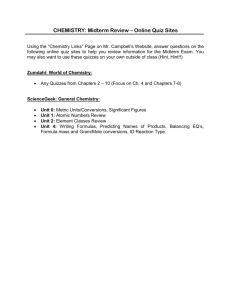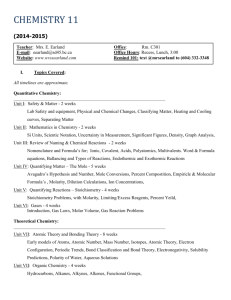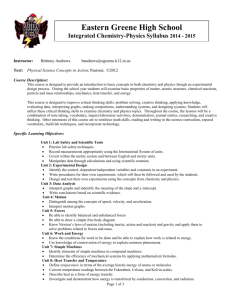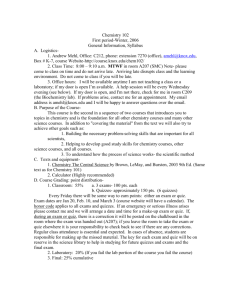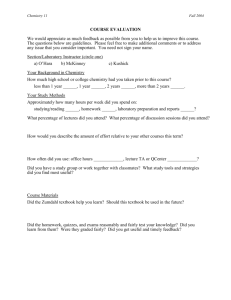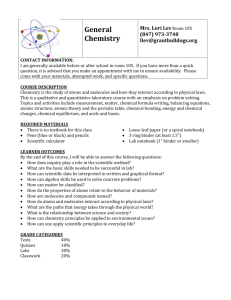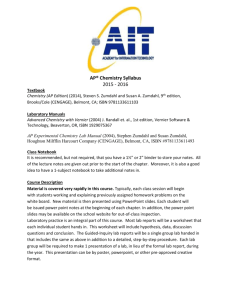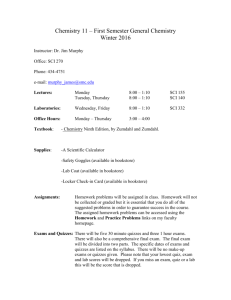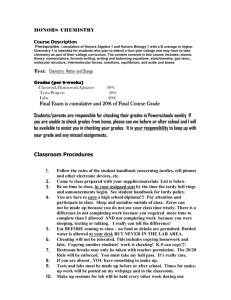AP Chemistry - The Covenant School
advertisement
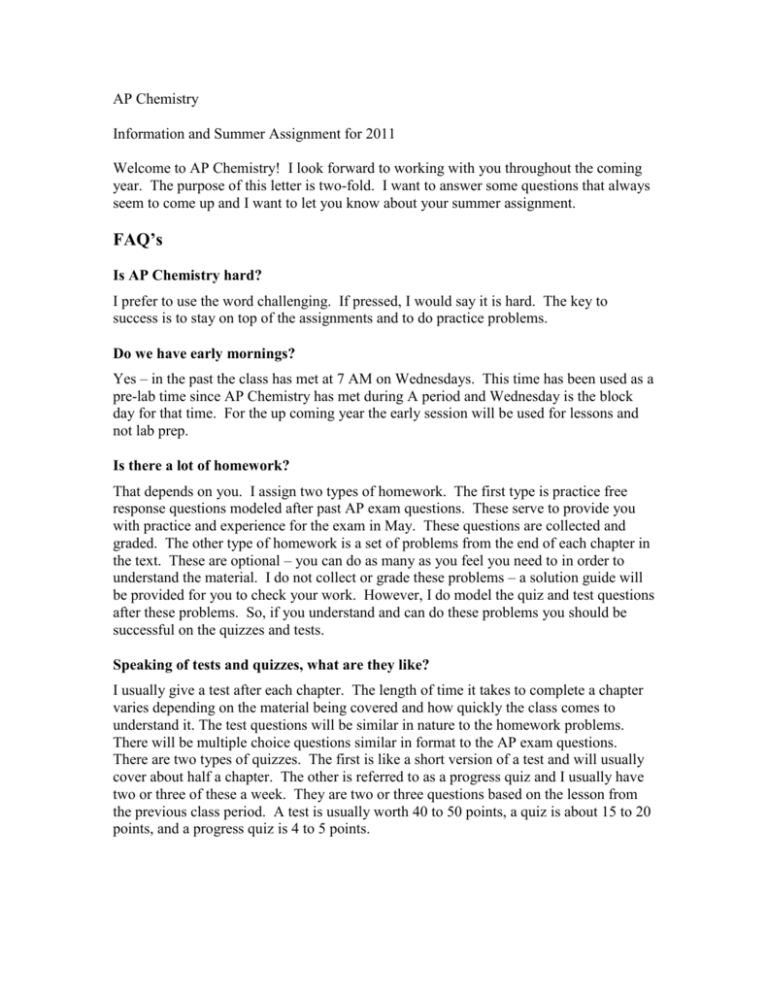
AP Chemistry Information and Summer Assignment for 2011 Welcome to AP Chemistry! I look forward to working with you throughout the coming year. The purpose of this letter is two-fold. I want to answer some questions that always seem to come up and I want to let you know about your summer assignment. FAQ’s Is AP Chemistry hard? I prefer to use the word challenging. If pressed, I would say it is hard. The key to success is to stay on top of the assignments and to do practice problems. Do we have early mornings? Yes – in the past the class has met at 7 AM on Wednesdays. This time has been used as a pre-lab time since AP Chemistry has met during A period and Wednesday is the block day for that time. For the up coming year the early session will be used for lessons and not lab prep. Is there a lot of homework? That depends on you. I assign two types of homework. The first type is practice free response questions modeled after past AP exam questions. These serve to provide you with practice and experience for the exam in May. These questions are collected and graded. The other type of homework is a set of problems from the end of each chapter in the text. These are optional – you can do as many as you feel you need to in order to understand the material. I do not collect or grade these problems – a solution guide will be provided for you to check your work. However, I do model the quiz and test questions after these problems. So, if you understand and can do these problems you should be successful on the quizzes and tests. Speaking of tests and quizzes, what are they like? I usually give a test after each chapter. The length of time it takes to complete a chapter varies depending on the material being covered and how quickly the class comes to understand it. The test questions will be similar in nature to the homework problems. There will be multiple choice questions similar in format to the AP exam questions. There are two types of quizzes. The first is like a short version of a test and will usually cover about half a chapter. The other is referred to as a progress quiz and I usually have two or three of these a week. They are two or three questions based on the lesson from the previous class period. A test is usually worth 40 to 50 points, a quiz is about 15 to 20 points, and a progress quiz is 4 to 5 points. What are the labs like? I usually schedule 5 or 6 labs per trimester. I go on the assumption that each student in AP Chemistry can function safely in the lab. I will teach you some new techniques and method. Mostly I monitor you work and offer advice. I feel you are mature enough to prepare for the lab and I let you work at your pace. At the beginning of the year you will submit a formal lab write-up using a format I provide. Once I am confident that you know how to properly document your lab work, I will allow you to do a modified format. All labs will be typed. Since we do not have many block days at the beginning of the year and the first lab is rather long, we will take a few hours on a Saturday to complete the first lab – a determination of the percent composition of iron, potassium, and permanganate in a compound. Is there work over the summer? Yes. The summer assignment acquaints you with the style, reading level, and problems in a college chemistry text. It also saves class time for learning new material. The class is very pressed for time as you will cover 8 college credits of chemistry in a high school schedule; one way to avoid additional meetings other than those that must be scheduled is to complete all review material during the summer. This will gain you many more days of class time next spring. This assignment is fairly extensive. Get off to an early start! You should purchase your textbooks right away. What is the summer assignment? The summer work is in two parts. The first is memory work and the second is problems. MEMORY WORK – Test first week back This is basic chemical vocabulary and not knowing it will cause a constant and continuous loss of points on tests and quizzes throughout the year. Most of this is review but some of it is new. Do not wait until the first week of school to start on this. Students who put this off usually earn very low scores on the first test as well as subsequent tests. Your brain learns material like this best if you work on it in small, frequent “chunks” with frequent review, separated by nights of good sleep. I strongly recommend organizing the material on flashcards which you can review often throughout the summer. From Zumdahl Chapter 1: Table 1.2—prefixes in blue, omitting “hecto” and “deka” From Zumdahl Chapter 2: Tables 2.3, 2.4, 2.5, 2.6, 2.7, 2.8 Figure 2.22 (just the ion symbols and charges, not their placement on the periodic table; note that most of these are also included in other tables) Fig 2.23 From Zumdahl Chapter 4: Review the chapter and learn the solubility rules I have handed out. If you loose the handout at least make sure you know the rules on page 144 of your text. Know the element names (spelling counts) and symbols for the following: Ag Al Ar As Ba Be Bi Hg B Br Cd Ca C Cs Cl Ti Cr Co Cu F Au He H Zn I Fe K Kr Li Mg Mn Ne Ni N O P Pb Pt Ra Rn S Si Sb Sn Sr The seven diatomic elements: H2, N2, O2, F2, Cl2, Br2, I2 PROBLEMS – Test the second week back CHAPTER 1: Read the chapter. Do exercises: 20, 21, 25, 28, 29, 32, 36, 46, 51, 54, 58, 60, 67, 68, 70, 74, 78, 83, & 87. (Topics include: measurement, conversions, sig figs, density, classification of matter, precision and accuracy, error and percent error.) CHAPTER 2: Read the chapter. Do exercises 18, 22, 30, 31, 34, 50, 52, 56, 63, 68, 70, 76, 79, & 82. (Topics include: atomic theory, atomic structure, atomic notation, and nomenclature) CHAPTER 3: Read the chapter. Do exercises 21, 22, 25, 29, 34, 38, 44, 46, 51, 58, 60, 68, 70, 73, 82, 83, 91, 94, 99, 102, & 105. (Topics include: average atomic mass, atoms ↔ moles ↔ grams conversions, molar mass, % composition, reaction stoichiometry, limiting reactant, theoretical and percent yield.) CHAPTER 4: Do exercises 22, 29, 55, 56, 59, 67, 72, 74a & b, & 75a. If you have any other questions, please feel free to ask me. You can email me over the summer at either: rfuhrman@covenantschool.org refuhrman@gmail.com I will also be glad to schedule some help sessions over the summer if you are interested.
